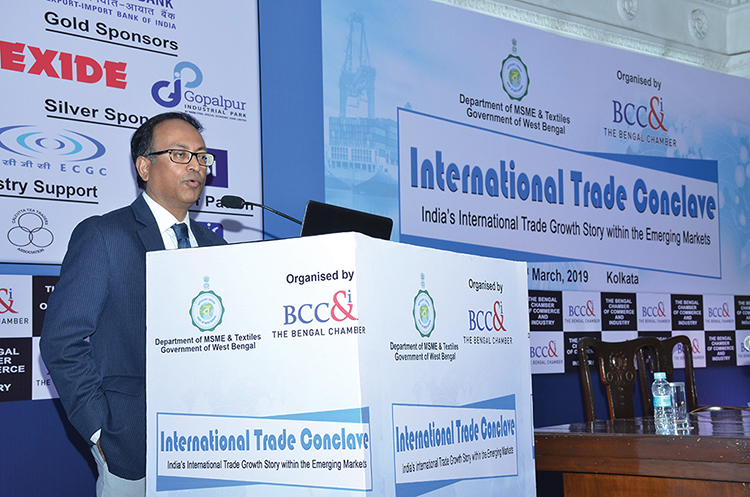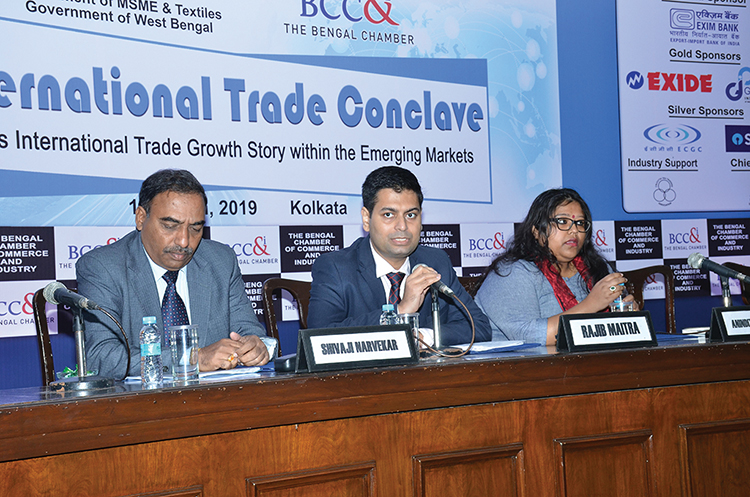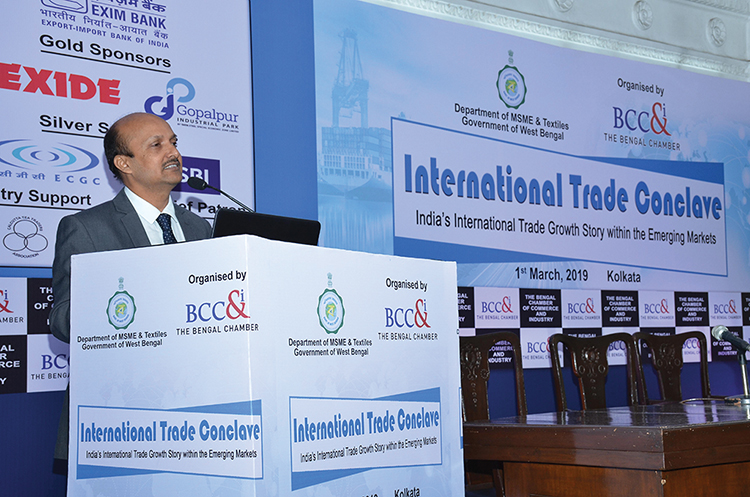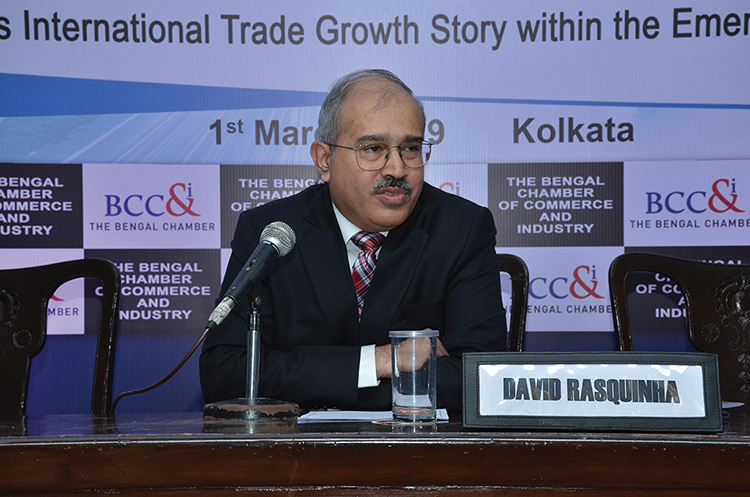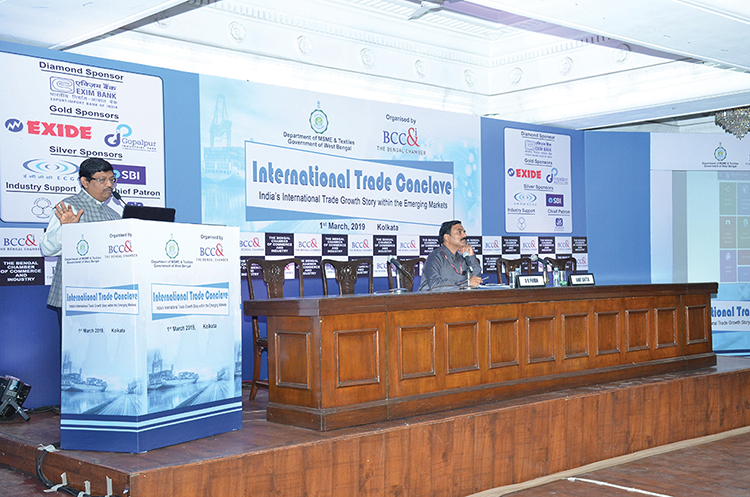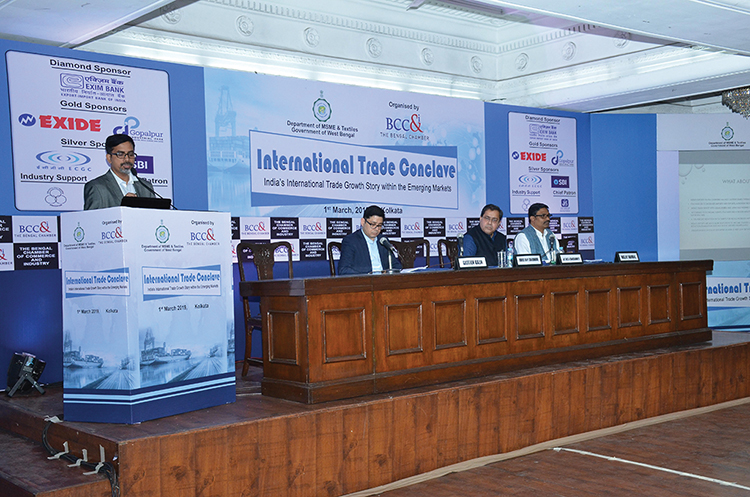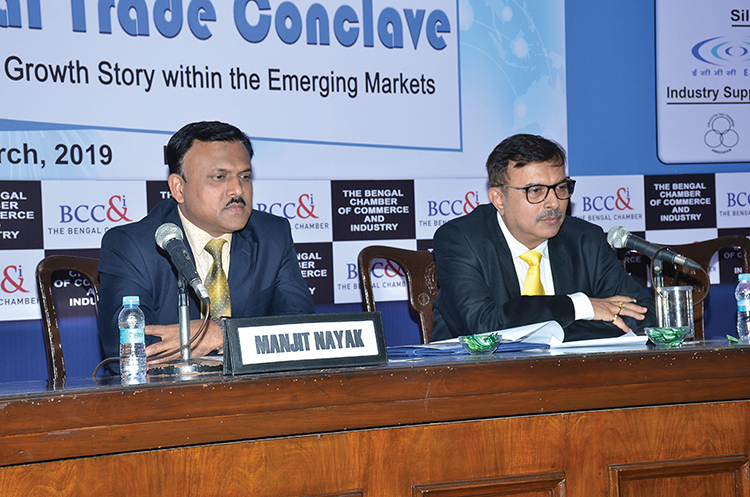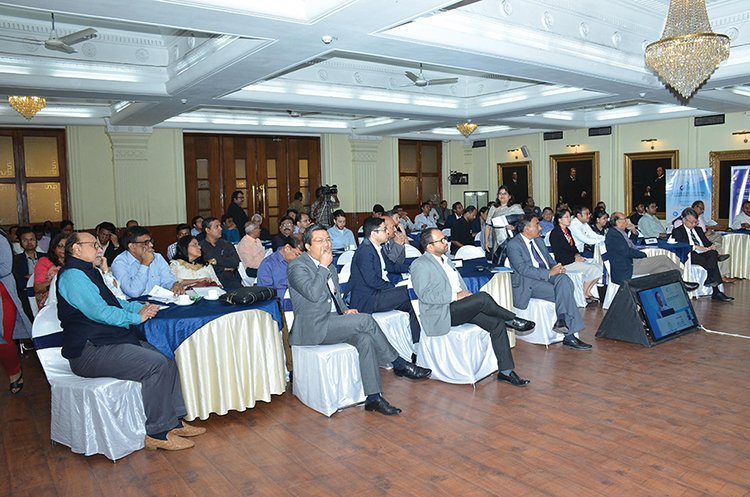In the context of the present scenario of International Trade,
where huge opportunities have opened up for India with Trump-economics, revival of EU demand,
China's policy towards green tech, opportunities in the emerging markets, and other geopolitical
advantages, the Bengal Chamber of Commerce
& Industry organised an International Trade Conclave on 1st March 2019.
The real challenge for India lies not in the volume of its exports but the structure. The biggest
labour-intensive export industry-gems and precious metals-provides one-time value addition with
negligible power to boost real economic transformation. Even in the context of seizing the
opportunity in labour-intensive sectors such as apparels and electronics, India struggles for
comparative advantage against low-end manufacturers, such as Bangladesh and Vietnam. This weakening
competitiveness needs to be addressed to sustain employment-generating export growth. The key lies
in improving infrastructure, financing, easing land acquisition and boosting human capital.
Against a backdrop of growing protectionist policy measures in many developed economies, EM
countries are, by contrast, actively cultivating and developing their trade partnerships. Several
factors have recently shifted the gravitational axis of world trade in EM's favour. The US
withdrawal from the Trans- Pacific Partnership (TPP) earlier this year has largely been viewed as a
geopolitical and economic boon for China as it creates space for it to fill the void in trade in
East Asia. This should liberalise commerce across several EM nations including Chile, Peru and
Malaysia, and - if agreed - would be one of the world's most significant multilateral trade deals.
More and more, EM countries' most important import and export
partners are other developing nations. China, for example, is
by far the top export destination for Brazilian products. While South Africa, India and Russia
import more goods from China than any other country. This intra-regional trade is only set to
continue with trade blocs, such as the ASEAN Free Trade Area (which includes Thailand, Vietnam,
Indonesia, Malaysia, Philippines, Singapore, Myanmar, Cambodia, and Laos) generating considerable
internal trade momentum outside trading links with developed markets. Emerging countries are also
becoming increasingly significant in terms of international trade as they become wealthier and
domestic demand rises. As demand and consumption rises in EM, a confluence of supply side reforms,
efficiency improvements and innovation has also paved the way for greater export capabilities.
Strong secular growth trends in EM have spurred a monumental supply-side response through
innovation, reforms and improved capacity utilisation. At the same time, recent shifts in
developed-world trade policy towards a more protectionist stance, have contrasted with the more
broadly free-trade outlook of EM countries. The eastern part of our country is rich in minerals,
there is a huge scope of infrastructure building, the location of Bengal is quite unique to connect
with the entire ASEAN countries, majority of the emerging markets. Keeping this in mind, the
International Trade Conclave was structured focusing on Trade Finance, Technology, Emerging markets
and Importance of SEZs. Special focus was also laid on Exports by MSMEs in Bengal and Opportunities
of IT Exports from West Bengal.
As Bengal can play a pivotal role in India's Act East Policy, Bengal government has set a target of
doubling the export growth rate of the state within 2021. There was an export of
8.23 billion US dollars from Bengal in the financial year 2016-
17, which has gone up to 9.15 billion US dollars in 2017-18.
Products worth around Rs 62,000 crore have been exported from the state in 2017-18.
Huge emphasis has been put on MSME exporters to flourish from the State Government. Some of the
measures taken by the Government of West Bengal for the benefit of its exporters are:
1. Information centre, set up jointly by the West Bengal Industrial Development Corporation (WBIDC)
and the MSME department, to disseminate information relating to the exports and various schemes.
2. Export cell, set up at the district industrial centres, so that people interested in exports can
gather information relating to it.
3. Around 80 officers from industry and MSME sectors to receive training at the Institute of
Foreign Trade in Kolkata, for a period of one month from July 5.
4. Transport subsidy has been provided by the State Government for the benefit of potato farmers,
businessmen and cold storage owners, for exporting potatoes to other states.
Software exports made by STPI from WB Durgapur, Haldia, Kharagpur, Siliguri & Kolkata was recorded
at Rs. 7151 crores during 2016 - 17 which placed the state in a prominent position on the IT map of
the country. It is clear that MSME Department is playing a crucial role in making significant
changes to ensure growth of trade across the districts.
The International Trade Conclave very successfully captured the opportunities ahead in IT Export
and other exports from the MSME sector of the state.
The Conclave witnessed the presence of many eminent speakers whose presence was much relevant for
the summit.
Mr. David Rasquinha, Managing Director, Exim Bank of India
graced the occasion as the Guest of Honour. Other important speakers in the conclave were Mr.
Shivaji Narvekar (General Manager - National Marketing Division), ECGC, Ms. Anindita Chatterjee,
Partner, Tax Connect Advisory Services LLP, Mr. Rajib Maitra, Member, International Trade
Committee, BCC&I and Director, Deloitte Touche Tohmatsu India LLp (Trade Infrastructure), Mr. B K
Panda, Development Commissioner, Falta Special Economic Zone, Ministry of Commerce, Govt. of India,
Mr. Sushanta Kumar Mishra, Vice President (Operation), Tata Steel Special Economic Zone Limited,
Mr. Amit Datta, Joint Secretary- Exports & Director & Member Secretary- WBSEPS, Government of West
Bengal, Mr. Gautam Kalia, Head - International Markets, Philips Carbon Black Limited, Mr. Jayanta
Chakraborty, Senior General Manager, Indofil Industries Limited, Mr. Manjit Nayak, Additional
Director (Officer-In-Charge), Software Technology Parks of India (STPI), Kolkata and Mr. Aninda
Chatterjee, MD, WEBEL among others and Professor Pulak Ghosh, Decision sciences and Public Policy-
IIM Bangalore.
The participants were mostly exporters from different industrial sectors.
The International Trade Conclave was successfully organised under the able leadership of Mr.
Sourabha Dutta, Chairperson, International Trade Committee, BCC&I and Senior Vice President -
Industrial Sales & Marketing, Exide Industries Limited, Dr. Bibek Ray Chaudhuri, Co Chairperson,
International Trade Committee, BCC&I and Associate Professor, Indian Institute of Foreign Trade and
Mr. A Mandal, Chairperson Emeritus, International Trade Committee and President - Business
Development, Techno Electric and Engineering
Company Limited.
PROGRAMMES
-
Annual General Meeting 2018
Annual General Meeting 2018
- The Bengal Chamber Annual General Meeting 2018, 12th September 2018, The Bengal Chamber Premises (Annual Reception in the Evening at the Hyatt Regency).View Details
-
Agro and Rural Development
AGRO AND RURAL DEVELOPMENT
- BCC&I Rural Connect 2018, 3rd & 4th December, 2018, Biswa Bangla Convention Centre, Rajarhat.View Details
- Dr. Meghnad Saha Memorial Lecture, 12th February, 2019, Ramakrishna Mission Institute of Culture, Golpark. View Details
- Annual Endowment Lecture, 20th February, 2019, Chamber Premises.View Details
-
Economic Affairs
Economic Affairs
- Interactive Session on Current Economic Realities, 10th October, 2018, Bengal Lounge. View Details
- BCC&I India Economic Conclave, 14th December, 2018, Chamber Premises.View Details
- Interim Union Budget 2019-20 Viewing Session, 1st February, 2019, Chamber Premises.View Details
- State Budget Viewing Session, 4th February, 2019, Chamber Premises.View Details
- The Union Budget 2019-20 Viewing Session, 5th July, 2019, Chamber Premises.View Details
- The Post-Budget Analysis Session ‘Union Budget 2019-20: An In-Depth Analysis’, 6th July, 2019, The Park, Kolkata.View Details
-
Education
Education
- BCC&I Annual Education Conference 2019, “21st Century Realities & Learning – Creating More Polymaths”, 3rd May, 2019, Hyatt Regency, Kolkata.View Details
- Conference on Early Childhood organized by The Bengal Chamber of Commerce and Early Childhood Association, 13th Jul, 2019, Chamber Premises.View Details
-
Entrepreneurship Development
Entrepreneurship Development
- Domain Name Roundtable Workshop, 29th September, 2018, Ranchi. View Details
- Entrepreneurs' Business Summit, 16th November, 2018, Williamson Magor Hall, The Chamber Premises, Kolkata.View Details
- ‘The Rising Foodpreneurs’, 16th February, 2019, Chamber PremisesView Details
- ‘An Interaction on IP Creation – A Business Breakthrough’, 10th June, 2019, Hotel De Sovrani, Kolkata. View Details
- ‘An Insight into Funding for Startups & MSMEs’, 1st July, 2019, Hotel De Sovrani, Kolkata.View Details
-
Energy and Environment
Energy and Environment
- World Sustainable Development Summit (WSDS) 2019, Kolkata Regional Dialogue on ‘Preparing for the Future of Urban Mobility’, 4th October, 2018, The Bengal Chamber PremisesView Details
- Discussion Forum on Ecological Sustainability in the Industrial Region, 30th November, 2018, The Golden Retreat, Haldia. View Details
- ‘Future Ready Cities – An Experience Sharing with Norway’, 17th December, 2018, Hyatt Regency, Kolkata.View Details
- Workshop on “Strategic Vision for Emission Control ”, 5th February, 2019, Chamber Premises. View Details
- Interactive Session on Clean Energy and Transport Choices and their effects on Air Quality”, 1st March, 2019, Chamber Premises.View Details
- Round Table Discussion on “Sustainabilty as Strategy in Business”, 8th May, 2019, Chamber Premises.View Details
- Sustainability Dialogue for North Bengal, 29th May, 2019, Hotel Sinclairs, Siliguri.View Details
- Powered by Tech, 2nd August 2019, Le Meridian, New DelhiView Details
- 12th Edition of Bengal Chamber, Environment and Energy Conclave, 29th August 2019, ITC Sonar, Kolkata View Details
-
Exhibitions and Trade Fairs
Exhibitions and Trade Fairs
- India International Siliguri Trade Fair 2018, 28th September, 2018, Siliguri.View Details
- 17th India International Mega Trade Fair Kolkata 2018, 14th – 25th December, 2018, Science City Grounds, Kolkata.View Details
- India International Mega Trade Fair 2019, 25th January – 4th February 2019, Bhubaneswar.View Details
- India International Mega Trade Fair 2019, 15th – 25th February, 2019, Vishakhapatnam.View Details
-
Health
Health
- A Musical Evening by Pandit Bickram Ghosh and Shri Amaan Ali Bangash on the Occasion Awareness on “Deceased Donor Programme – Cadaver Daan”, 8th December, 2018, Tollygunge Club, Kolkata. View Details
- The Sunfeast Farmlite 10th Health & Lifestyle Quiz, 4th July, 2019, Chamber Premises.View Details
-
HR / IR
HR / IR
- ‘Next Gen Employability Industry-Academia Networking Meet, 19th January, 2019, Hotel The Citi Residency, Durgapur.View Details
- BCC&I Secretariat Visit to Bangladesh, 23rd April – 26th April, 2019, Dhaka, Bangladesh.View Details
- ‘The People Management Conclave – 2nd Edition – Achieving Business Competence through Capability Building’, 5th July, 2019, Hotel Novotel, Rajarhat, Kolkata.View Details
-
Information Technology
Information Technology
- “Cyber Terrorism and the Economy – A Gathering Storm”, 16th January, 2019, The Lalit Great Eastern, Kolkata. View Details
- The Bengal Chamber Technology Quiz - Inter-College Quiz Fest, 30th March 2019, Guru Nanak College Campus, Sodepur. View Details
- Health Tech 2019, 12th -13th April, 2019, The Taj Gateway, Kolkata.View Details
- Evaluation and Selection of Shortlisted Incubates, 10th, 11th, and 13th June, 2019, WEBEL-BCC&I Tech Incubation Centre.View Details
- 10th Edition of the Business IT Conclave (BITC), 20th June, 2019, Hyatt Regency, Kolkata.View Details
-
International Relations
International Relations
- Interactive Session with Her Excellency Melba Pria, Ambassador of Mexico in India, 7th September, 2018, Chamber Premises. View Details
- Interactive Session with the Australian Deputy High Commissioner Mr. Rod Hilton on ‘An India Economic Strategy to 2035: Navigating from Potential to Delivery’, 20th September, 2018, Chamber Premises.View Details
- Interactive Session with H.E. Brigitte-Walchshofer, Ambassador of Austria to India, Austrian Embassy, New Delhi, 3rd October, 2018, Chamber Premises.View Details
- Cocktails and Conversation on “The Future Mobility in Kolkata”, 1st November, 2018, The Bengal Club.View Details
- Awareness Generation and Capacity Building Workshop on BBIN – MVA, 12th December, 2018, Kalpana Inn, Durgapur, West Bengal.View Details
- B2B Meeting with the Delegation of the Chittagong Chamber of Commerce and Industry, 30th January, 2019, Chamber Premises.View Details
- Japan Country Session at Bengal Global Business Summit (BGBS) 2019, 7th February, 2019, Biswa Bangla Convention Centre, Kolkata.View Details
- Meeting with dignitaries from EU Delegation to India and European Investment Bank, 21st February, 2019, Chamber Premises.View Details
- Meeting with Belgian Embassy Representatives, 14th March, 2019, Chamber Premises.View Details
- Meeting with Mr. Steven Liu, Director, Taipei World Trade Center, Liaison Office in Kolkata, 20th March, 2019, Chamber Premises.View Details
- Meeting with the officials of UK Government to discuss industry sectors where Bengal can draw more FDI, 26th March 2019, Chamber Premises.View Details
- Meeting with Mr. Matt Ingeneri, Economic Growth Unit Chief, Embassy of the United States of America (New Delhi), 11th April 2019, Chamber Premises.View Details
- Taiwan Delegation, 12th April, 2019, Kolkata .View Details
- Interactive Session on Doing Business with Hong Kong and Mainland China, 7th May, 2019, Chamber Premises.View Details
- Interactive Session with Trade Winds Business Delegation & Ms. Patricia Hoffman, United States Consul General in Kolkata, 9th May 2019, Chamber Premises.View Details
- Special Session with Mr. K V Kumar, Founding Chairman, Indian American International Chamber of Commerce (IAICC), 20th May, 2019, Chamber Premises.View Details
- An Interactive Session and B2B discussion with Dutch Delegation Focusing on Waterways Infrastructure Development, 14th June, 2019, Chamber Premises.View Details
- BCC&I Business Delegation to Germany, 24th June – 28th June, 2019.View Details
- Interactive Session with Mr. Robert Chatterton Dickson, British High Commissioner to Bangladesh, 25th July 2019, Chamber PremisesView Details
- Interactive Session with Mr. Rahul Tabhane, Country Head-India, UK Export Finance, British Deputy High Commission, Mumbai, 25th July 2019, Chamber PremisesView Details
- Interactive Session with Ambassador of Japan to India H.E Mr. Kenji Hiramatsu,10th August 2019 , The Bengal Lounge, Chamber PremisesView Details
-
International Trade Cell
International Trade Cell
- Workshop on Future of International Trade 2018 – 2019, & New Initiatives, 18th December, 2018, Chamber Premises.View Details
- International Trade Conclave – “India’s International Trade Growth Story within the Emerging Markets”, 1st March, 2019, Chamber Premises. View Details
-
Leadership Lecture Series
Leadership Lecture Series
- BCC&I Leadership Lecture with Mr. Sourav Ganguly, 14th December, 2018, Chamber Premises.View Details
-
Legal
Legal
- Round-Table Discussion on “Mediation – A Business Friendly Alternative for Dispute Resolution”, 7th June, 2019, Chamber Premises.View Details
- Awareness Seminar Mediation – A Cost Effective Option for Resolution of Disputes for SMEs [A collaborative effort of The Bengal Chamber & Bombay Chamber], 20th August 2019, Chamber premises, KolkataView Details
-
Marketing and Brand
Marketing and Brand
- 10th Edition of the BCC&I Marketing and Brand Conclave, “The Millennial Consumer and Future CMOs”, 23rd August 2019, ITC Sonar, KolkataView Details
-
Metals & Mining
Metals & Mining
- Metals Conclave 2019, Indian Metals Industry: Vision 2030, 28th May, 2019, The Park, Kolkata.View Details
- BCC&I Minerals & Mining Conclave 2019 -“Mapping Minerals & Mining Industry with the Future Economy“, 19th July 2019, Le Meridien, DelhiView Details
-
MSME Development, Manufacturing and Allied Activities
MSME Development, Manufacturing and Allied Activities
- Inauguration of The Bengal Chamber Centre of Excellence for MSMEs, 19th December, 2018, Chamber Premises.View Details
- Industrial visit to Durgapur, 12th January, 2019, IMERYS Steel Castings India (formerly Stollberg India Pvt Ltd).View Details
- Annual Manufacturing and MSME Conclave on “Long Term Approach towards Quality Manufacturing with MSME Focus” and Annual MSME Awards, 22nd – 23rd February, 2019, Chamber Premises.View Details
- “Neo MSME Summit – 2030: An MSME Odyssey”, 7th June, 2019, HHI, Kolkata.View Details
- Annual Workshop on Lean Management – The Key to Success, 5th to 6th July, 2019, Chamber Premises.View Details
-
Skill Development
Skill Development
- Eastern India Regional CXO Meet 2019 by Paschim Banga Society for Skill Development under Department of Technical Education, Training and Skill, Government of West Bengal along with The Bengal Chamber of Commerce and Industry as the Chamber partner, 26th July 2019, Biswa Bangla Convention Centre, RajarhatView Details
-
Shipping
Shipping
- BCC&I Annual Shipping Conclave on “Logistics in India – The Way Ahead”, 7th December, 2018, Chamber PremisesView Details
- Annual Shipping Workshop on Shipping Laws for Present Day Managers, 27th July 2019, Chamber Premises View Details
- Launch of Shipping Portal by Marine container Services (India) Pvt. Ltd, 9th August 2019, Chamber PremisesView Details
-
Social and Cultural
Social and Cultural
- “Ek Ananya Shruti Sangeet Sandhya”, 10th November, 2018, Mahanayak Uttam Mancha, Kolkata.View Details
- Bangla Utsob, 4th – 6th January, 2019, Nazrul Manch, Kolkata.View Details
- Ratnagarbha, 2019, 8th March, 2019, The Lalit Great Eastern, Kolkata. View Details
- SHER in Association with the Bengal Chamber Presents Conversation on Conservation in Evening with Acclaimed Nature & Wildlife Photographer, Mr. Dhritiman Mukherjee, Presenting his Photographs, the Stories and Ethics behind them, 3rd July, 2019, Chamber Premises.View Details
-
Sports
Sports
- Kheladhula Adda : ICC World Cup 2019, 21st May, 2019, Chamber Premises. View Details
-
Taxation
Taxation
- Seminar on GST Return Filing, 5th October 2018, Chamber Premises.View Details
- Seminar on Contentious Issues related to GST, Recent Notification & Circulars, 15th February, 2019, Chamber Premises. View Details
- Crash Course for GST Practitioner (GSTP) Exam, 31st May, 1st June, 7th June & 8th June, 2019, Chamber Premises. View Details
- ‘Workshop on GST and its Impact on Exports’, 13th June, 2019, Fortune Park Pushpanjali, Durgapur.View Details
-
Talk Series
Talk Series
- “Undaunted” – Saving the Idea of India : book launch, 14th March, 2019, Chamber Premises.View Details
-
Think Series
Think Series
- BCC&I “Think Lecture Series with R. Ramakrishnan, 19th November, 2018, The Bengal Lounge, The Bengal Chamber Premises.View Details
- BCC&I Think lecture and book launch "When Coal Turned Gold" authored by Shri Partha S Bhattacharyya, Former Chairman, Coal India, 18th April, 2019, Chamber Premises.View Details
-
Tourism
Tourism
- A Tale of Two Festive Cities, “An Adda on Durga Puja in London and Kolkata”, 28th September, 2018, British Club, Kolkata.View Details
- BengalWeekend.Com and Department of Tourism, Government of West Bengal presents “Weekend Wonders”, 16th – 18th November, 2018, Allen Park, Park Street, Kolkata. View Details
-
Women Empowerment
Women Empowerment
- The Bengal Fashion Heritage (TBFH) 2018, 22nd December, 2018, ITC Sonar, Kolkata.View Details
-
Other Programmes
Other Programmes
- Thought Leader Lecture Series 2018-2019, 5th October, 2018, The Bengal Lounge.View Details
- Interactive Session with Dr. Sanjeev Chopra, IAS, Additional Chief Secretary, Department of Industry, Commerce and Enterprises & Director General, Administrative Training Institute, Government of West Bengal, 4th December, 2018, Chamber Premises.View Details
- Talk on “Artificial Intelligence and Robotic – Applications in Healthcare and Manufacturing” by Dr. Arpan Pal, Chief Scientist and Research Area Head, Embedded Systems and Robotics, TCS Research and Innovation, Tata Consultancy Services at the Managing Committee Meeting, 4th February, 2019, Chamber Premises. View Details
- Interactive Session with Smt. Roshni Sen, IAS, Principal Secretary, Department of Technical & Skill Development, Government of West Bengal during the Chamber’s Managing Committee Meeting, 26th March, 2019, Chamber Premises.View Details
- The Chamber’s Managing Committee’s Interactive Session with Dr. Michael Feiner, Hon’ble Consul General, Consulate General of the Federal Republic of Germany, Kolkata, 17th May, 2019, Chamber Premises. View Details
- The Chamber’s Managing Committee’s Interactive Session with Mr. Andrew Ford, Hon’ble Consul General, Consulate General of Australia in Kolkata, 24th July 2019, Chamber PremisesView Details
- Commemoration of Prince Dwarakanath Tagore’s Two Hundred and Twenty Fifth Birth Anniversary, 3rd August 2019, Chamber PremisesView Details
- Press Clippings
-
Appendix
Appendix
- PRESIDENTS OF THE BENGAL CHAMBER OF COMMERCE AND INDUSTRYView Details

